The Anti-Slavery Amendment to the Constitution, passed the House of Representatives of the United States Congress, on Tuesday last. As the resolution has passed the Senate, nothing is now required but the endorsement of the measure by three-fourths of the States.

From the February 10, 1865 edition of the Vineyard Gazette:
Amendment Ratification
Owing to the lateness of the hour at which the mails are received at Edgartown, it was impossible that the request of Gov. Andrew, as published in the Boston morning papers of the 2s inst, should be carried into effect on that day. But on the following day, Friday the 3d., all the church bells in the place were rung from ten till eleven o'clock, A.M., pealing merrily, and flags were displayed from the Liberty Pole, Custom House, Post-Office, and elsewhere.
During the day, at the suggestion of some citizens, a public meeting was announced for the evening, at the Town Hall. At the hour assigned a large number of people of both sexes were present. The meeting was organized by the choice of Joseph T. Pease, Esq., as Chairman, and H. Vincent as Secretary. It was further opened by prayer by Rev. John E. Wood. A committee consisting of Rev. J. E. Wood, and John Mayhew and David Davis, Esquires, was appointed to report resolutions for the consideration of the meeting. While the committee were out, the Chairman of the meeting, on being called up, made a very effective opening address, in which he ably discussed the importance of the measure now adopted by Congress in order to the removal of that which has been the main cause of this war. The Committee, on coming in, reported as follows:
Resolved, That slavery as it has hitherto existed in the United States, is in derogation of the principles of the Declaration of American Independence, and a stain upon our national character; and that the patriots have ever regretted its existence, and have ardently desired its final extinction; looking forward with confident expectation, that, in the good providence of God, some door of relief would be opened, and that period be ushered in when slavery would be unknown, and when, as Washington wrote to Lafayette, we should have a confederacy of Free States.
Resolved, That we welcome with heartfelt pleasure the evidently near approach of the time when no man can honestly call the fundamental principles of the Declaration of Independence mere “glittering generalities,” but when all men shall indeed be “free and equal,” and the blessings of liberty, free thought and free speech, be forever secured to all.
Resolved, That pure christianity demand the recognition of universal human brotherhood as a truth deduced from revelation, which teaches that “God is no respecter of persons,” but that He hath “made of one blood all nations of men to dwell on all the face of the earth.”
Resolved, That the passage, by the requisite majority of Congress, of an amendment to the Constitution providing that “neither slavery nor involuntary servitude except as a punishment for crime, whereof the party shall have been duly convicted, shall exist within the United States, or any place subject to their jurisdiction,” is an occasion that calls for the profoundest gratitude of Almighty God, who has watched over our nation fro its infancy, and is now leading our steps, in the fearful struggle between liberty and slavery, to the assured and certain establishment of a lasting peace, founded in righteousness.
After the reading of the resolutions, the Rev. Seth Reed was called on for a speech, being it was stated, “always ready.” Mr. Reed said he was not always ready but he was then. He, however, thought he had no particular speech to make. This was not a time for speeches, but for short, simple, heartfelt expressions of our gratitude to God for what had been accomplished toward the entire extirpation of the great evil of slavery. He rejoiced that he had lived to see this day. Different topics connected with the occasion of our gathering were then briefly touched upon, and the various classes who should rejoice at the great moral triumph referred to. Among the latter were, the four millions of slaves – freed and about to be freed: the eight millions of whites of the South; we of the North – the whole nation; other nations – the whole world. It proved to be a speech, one of the reverend gentleman's best, closing with eloquent strains which brought down the house in storms of applause. After music, Mr. H. Vincent, on being called, united with the preceding speaker in expressions of gratitude that he had lived to see this day, contrasting the present state of things with that of about thirty years since, when the first anti-slavery society of the place was formed in that very house, then a church. Rev. John E. Wood, then, in an excellent speech, vindicates the colored race against the effete arguments so frequently urged in their disfavor, and showed that they were entitled to all the immunities so frequently urged in their disfavor, and showed that they were entitled to all the immunities now to be secured to them. The Rev. Hartford P. Leonard, addressed the meeting in earnest terms, alluding to the great change wrought within the last few years, since the troublous times in Kansas, himself residing in that territory at the time, and having, with many others, to defend his own home against the aggressions of the “border ruffians.” Hon. Davis joined with the other speakers in expressions of gratitude to God for the exercise of his controlling power in these times of trial through which the nation is passing, and the great boon secured by the passage of the Constitutional amendment. The resolutions were unanimously adopted. The meeting held till a late hour, - and closed by singing in grand chorus, “America,” and “Old Hundred.” The sentiments expressed, and the spirit manifest partook largely of the truly religious element, as well as of the patriotic; and as a whole, it was an ovation.
H. Vincent.

Editorial
Man is but the creature of circumstance, and should not be held responsible for the complexion of his opinions, honestly entertained, more than for the hue of his skin. No enlightened and intelligent being can say, to-day, what his opinions will be a year hence, on measures of national polity, and all the abuse heaped upon members of the House of Representatives who voted adversely on the question of amendment to the constitution, on a former occasion, and who have since seen fit to vote in the affirmative, we consider perfectly gratuitous on those who attributed to them other than righteous motives for such change in the human mind, as well as in other departments of nature. What we believe at the present to be just and right, may be satisfactorily proven to be wrong and unjust before the waning of another moon, and thus the fallibility of human judgement has been, again and again, demonstrated, and yet there are those who will see no cause for any change in opinions of public men other than the accomplishment of some selfish purpose. Many of this class plume themselves with being consistent because they still adhere to the political traits and party name bequeathed to them by their fathers, and believe all to be renegades – influenced by mercenary motives – who refuse longer to follow in the beaten track, and support exploded opinions. They forget that “nature's mighty law is change,” and that measures that proved advantageous to the nation fifty years ago might prove worse than useless were they re-enacted tomorrow.
“There is a time for every purpose and every cause.”
The black spot that has so long disfigured the garments of a professedly free people has, by this amendment to the constitution, been forever washed away, and the Declaration of Independence endorsed by the Southern States. We cannot, hereafter, justly be charged with inconsistency, nor will it be said, in future, of our banner, that “the stars keep winking at the bloody stripes.” e have torn the lash from the hands of the task-master, and his late bond man looks him despitefully in the face. The future historian will point to the leaders of the rebellion as being the indirect cause of the abolition of slavery on this continent – showing how good is made to spring out evil, and that the vexed question that so long disturbed our national councils owes its extinction to their agency.

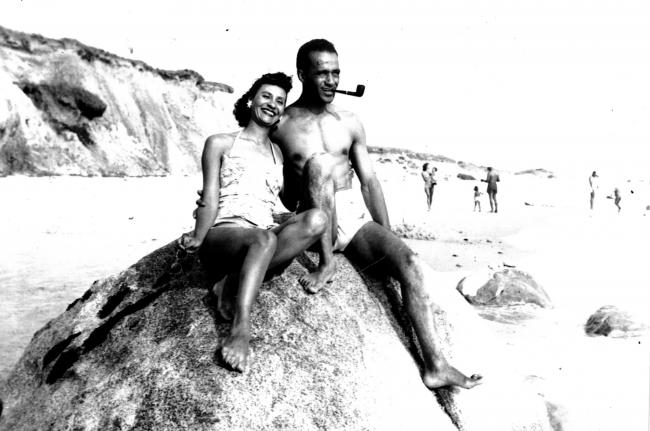




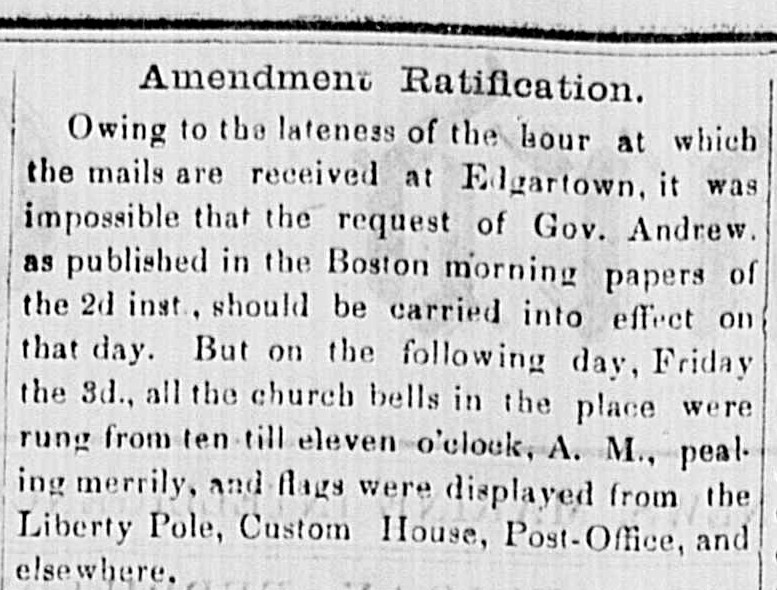
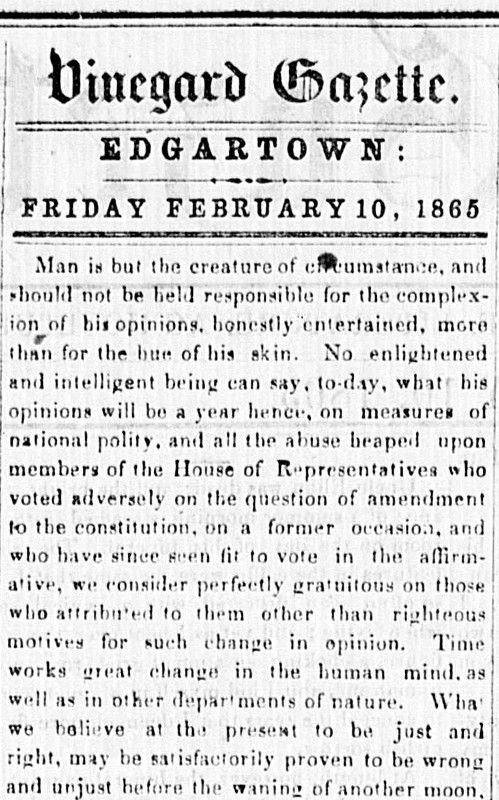

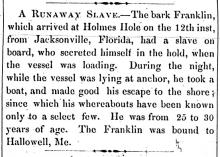

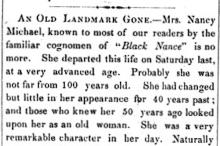
Comments